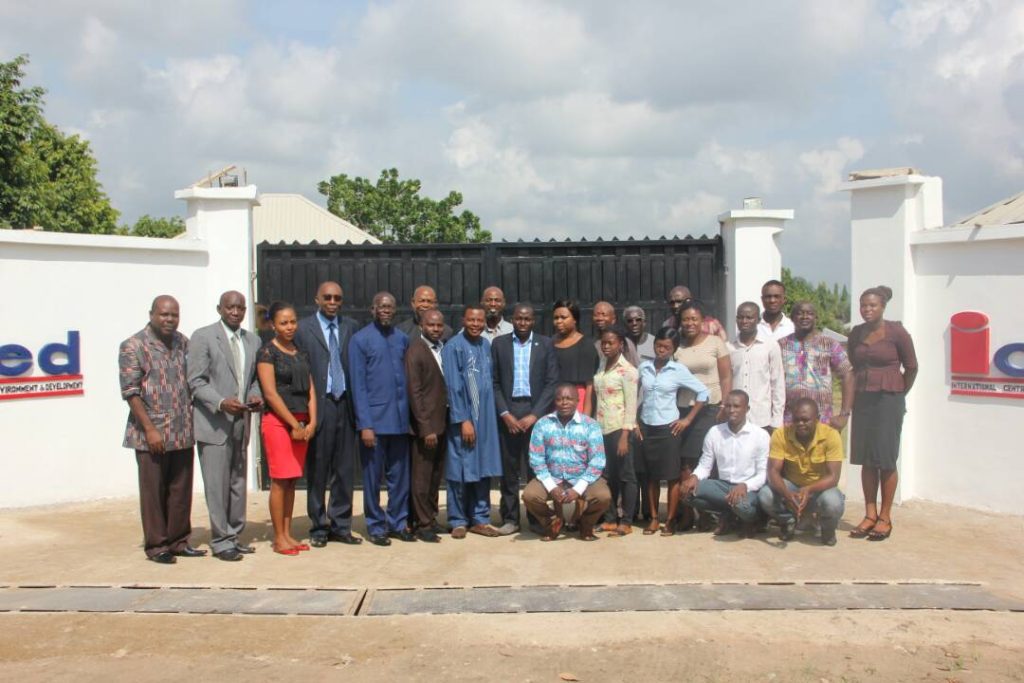In collaboration with the International Centre for Energy, Environment & Development (ICEED), the ECOWAS Centre for Renewable Energy and Energy Efficiency (ECREE) is training scientists and representatives of the clean cooking energy industry in West Africa on testing and standards. The training programme held at the ICEED Clean Energy Training Centre in Afikpo June 5 – 9, 2017 brings together about thirty representatives of the clean cooking industry in West Africa to learn the latest developments on stove testing and standards and forge collaboration among West African countries.
Over 90% of households in the ECOWAS region are dependent on traditional use of wood as a primary energy source for cooking. Globally, smoke from the kitchen results in over four million deaths annually. Traditional cooking methods are also expensive, burning up to 90% more wood than is necessary and costing poor families in West Africa money that could be put to better use on education, health and nutrition.
more wood than is necessary and costing poor families in West Africa money that could be put to better use on education, health and nutrition.
In welcoming the participants, the Chairman of Afikpo North Local Government Council, Chief Oko Enyum applauded ECOWAS and its agency ECREEE for providing leadership in dealing with the important problem of access to clean cooking energy. According to him, “Afikpo is proud to host representatives of almost all the countries in West Africa on such an important issue. We are a peace loving people and our town presents an ideal location for knowledge based work and investments”. He thanked ICEED for helping in building skills for the West African region.
Testing and standards are key to growing the market for the clean cooking energy solutions in the region. Lack of standards and regulations for clean cookstoves hinders stove manufacturers’ efforts to differentiate their stoves, and also prevents consumers, investors and donors from making informed decisions. Despite the importance of stove testing and standards, a majority of countries in the region do not have testing laboratories and lack the required capacity and awareness on stove testing and standards.
In his remarks, Mr Bah Saho, the head of the ECREEE delegation restated the commitment of the ECOWAS agency in harmonizing standards on clean cooking. According Mr Saho, “the week in ICEED Afikpo is the first step in building the regional skill base for harmonizing standards and ensuring that each country in ECOWAS are able to provide quality assurance on clean cooking. With support from ICEED and our funding partners such as Austrian Development Cooperation, we hope in the future to support each country in building training centres,” he told the delegates.
ICEED established the Clean Energy Training Centre in Afikpo, Ebonyi State, Nigeria. The centre has an ISO certified testing laboratory. It seeks to improve technical standards for clean cookstoves; provide testing and certification services related to stove technical quality, indoor air pollution, and energy efficiency; assist stove developers in improving stove design and construction methods; and conduct research and development in collaboration with international research institutes and laboratories. The laboratory has trained numerous scientists, stove producers and professionals on stove testing protocols.
According to Ewah Eleri, the Director of ICEED, “the training centre in Afikpo will continue to open its doors to the clean energy value chain in Nigeria and the West African sub-region. Our hope is to help close the skills gap in clean cooking energy and solar energy technologies. ICEED is proud of the partnership with ECREEE”, he concluded.
During a courtesy visit to His Royal Highness Ezeogo Ewah Elechi, prayers and advice were offered by the traditional ruler. He enjoined ECREEE to make the ICEED Clean Energy Training Centre in Afikpo its centre of excellence. “Afikpo people are both ingenious and hospitable. The combination of peace, hospitality and talent makes our town an excellent place to carry out research and development on key national and regional issues”, he concluded.
Participants for the training workshop are drawn from Benin, Cape Verde, Gambia, Ghana, Mali, Niger, Nigeria, Senegal, Sierra Leone and Togo. Trainees will enhance their knowledge on testing protocols; understand the equipments required for complete stove testing, analysis and certification; and provide hands-on testing experience for both household and institutional stoves. At the end, participants will discuss the ISO process and development of national and regional standards.
Both ICEED and ECREEE hope to create the capacity for participants to conduct training for other professionals in their countries; and provide a basis for establishing testing laboratories in all the ECOWAS countries. ICEED and ECREEE will also seek to support the establishment of national standards and ECOWAS-wide regional standards; and increase regional awareness.

